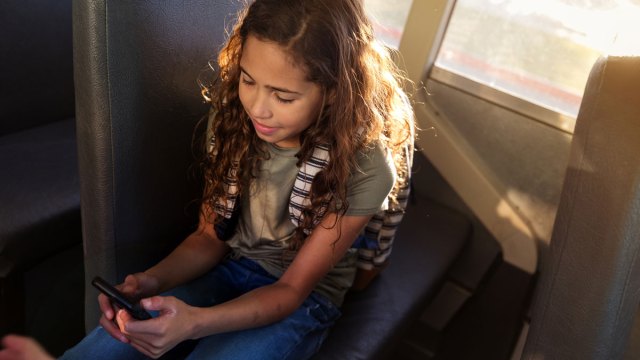If there’s one moment that sums up my adolescence, it would be my eighth-grade graduation dance. While every other girl my age was able to shop for a dress at just about any store, I was particularly shapely with a large bust. I had to literally squeeze myself into the options.
In a well-intentioned attempt to help me feel more comfortable, my mom took me to David’s Bridal and picked up a dress that she swore looked just like that one Kate Hudson wore in How to Lose a Guy in 10 Days. Yeah. OK, Mom.
Needless to say, it looked nothing like that. I felt totally uncomfortable and ashamed, said nothing, and spent the entire evening avoiding my classmates. At one point, I hid in the bathroom and cried. To add insult to injury, I was eventually found, which embarrassed me even more.
Did I hyperventilate to the point of dizziness? Of course. Did it feel like an elephant was sitting on my chest? You betcha. Looking back now, I wonder how things could have played out differently if I’d just told my mom how uncomfortable I really was—in the dress and in my own skin.
I was an anxious kid, and during that time, everyone around me wrote off those feelings and anxiety attacks as being “overly sensitive.” And so I took what they said to heart. I hardly mentioned the intrusive thoughts that crossed my mind—What if people think I look fat? What if they’re talking about me and making fun? How can I just blend into the background and go unnoticed?—and tried to silence them by ignoring them. I waited impatiently and nervously for things to get better. Spoiler alert: They didn’t.
In fact, it wasn’t until five years ago that I finally turned things around. I was so desperate to feel well that I had no choice but to speak up for myself. I told my primary care doctor that I felt my shortness of breath had more to do with being anxious than with my physical health and asked to be screened for anxiety. A few medications later, I found the right fit and was able to breathe easy again (literally).
But it shouldn’t have taken so long. In theory, advocating for yourself shouldn’t be that hard, right? To say, “Hey, I need help with this problem, and the solutions you’re giving me (in my case, downplaying my worries) aren’t doing any good.” But like many worthwhile things, it’s easier said than done.
In the years since then, becoming vocal about mental health care and encouraging conversations around mental illness has been a huge part of my life. Not only because I want to be happier and healthier, but because I have two small daughters who also have anxious personalities. And I’ll be damned if they’re also told to minimize those feelings and stop being so sensitive.
So my kids and I talk about mental health. all. the. time. Openly and honestly. Here’s what that looks like:
- We talk about their worries, no matter how big or small. Like how my 10-year-old will survive next year now that her best friend has moved away and how my 7-year-old can calm herself down when she’s really upset. For your kids, it could be something as small as worrying that they got one answer wrong instead of none or worrying about who they’ll play with at recess the next day. Whatever it is, they should never feel that their problem isn’t “big” enough to bring up to you.
- We validate their feelings and talk about what has been said or done to make them feel that way. Most importantly, I make clear that it is OK for them to feel whatever it is in its entirety.
- I work to create a truly safe space. As it happens, we still talk routinely about their fear and anxiety over what happened at Uvalde happening at their school, too. Having these conversations won’t eliminate their worries and anxiety altogether, but holding safe spaces that are judgment-free is the first step toward encouraging kids to express how they’re feeling—no matter how hard or uncomfortable those discussions may be.
- I encourage them to tune into their bodies. Advocating for their mental health isn’t about pushing back against every piece of advice they’re given, but it is about self-awareness and knowing when something doesn’t feel right.For example, are they feeling wheezy and dizzy because they’re under the weather, or is it because something spiked their anxiety and this is how their body reacts? Being self-aware in this way can also help them recognize when they should be reaching out to a trusted adult for extra help.
- We remain open to outside assistance if needed. Affordable and sometimes-free resources like therapy and counseling are well-worth exploring, though sadly not everyone has access to these options.Depending on how thin resources are stretched in your school district or community, this obstacle is a difficult one to overcome. But for instances that require more professional help, reaching out to your pediatrician or your child’s school counselor is a good place to start.
Hopefully, one or more of these practices resonates with you. But to every parent who isn’t sure how to help their kids prioritize and speak up about their mental health, I would say, don’t underestimate the power of not minimizing your kid’s feelings. Let them feel all the things—the hard, the uncomfortable, and all the great moments yet to come.
RELATED LINKS
Physicians’ Task Force Says It’s Time to Screen All Kids for Anxiety
20+ Calming Phrases That Will Help an Anxious Child
70% of Parents Support Mental Health Days for Students, Poll Shows
